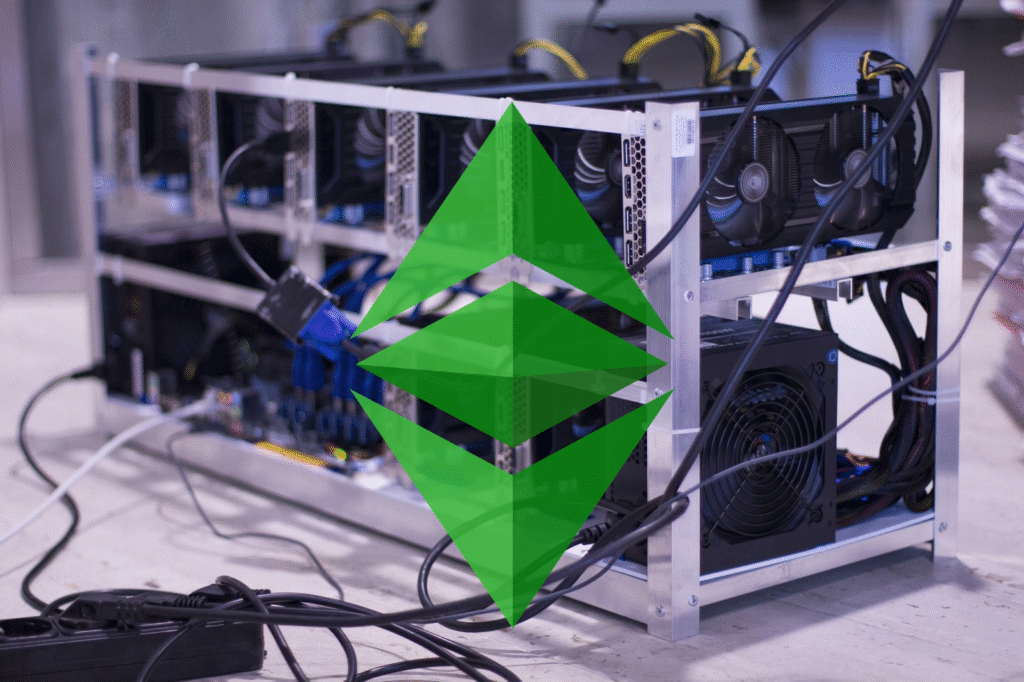Ethereum mining has become a popular and profitable venture for cryptocurrency enthusiasts and tech-savvy individuals alike. As the second-largest cryptocurrency by market capitalization, Ethereum’s blockchain technology enables decentralized applications (dApps) and smart contracts, offering vast opportunities for miners. However, with the ever-changing complexities of mining hardware, electricity costs, and network difficulty, miners often find themselves wondering: how much can I make from Ethereum mining?
This is where an Ethereum mining calculator comes into play. A mining calculator allows you to estimate your potential earnings based on various factors such as hash rate, power consumption, and electricity cost. By using this tool, miners can gain a clearer understanding of whether mining Ethereum is profitable for them. In this article, we’ll explore the Ethereum mining calculator, how it works, and why it’s a vital tool for anyone interested in crypto mining.
Ethereum Mining
Ethereum mining is the process through which new transactions are validated and added to the Ethereum blockchain. Unlike traditional banking systems, Ethereum uses a decentralized network of miners who solve complex mathematical puzzles. Miners who successfully solve these puzzles are rewarded with ETH, Ethereum’s native cryptocurrency. This proof-of-work (PoW) mechanism requires significant computational power, making mining both an energy-intensive and rewarding activity.
In Ethereum mining, miners need specialised hardware like ASIC miners (Application-Specific Integrated Circuits) or GPUs (Graphics Processing Units). The power of these devices is measured in hash rate, which refers to the speed at which a miner solves computational puzzles. The higher the hash rate, the greater the chance of solving the puzzle and receiving ETH as a reward. However, with the growing network difficulty and fluctuating ETH prices, mining profitability can vary greatly from one miner to another.
This is why using an Ethereum mining calculator is crucial. It helps estimate your potential profits by considering various factors like your mining hardware’s hash rate, electricity costs, and the current Ethereum network difficulty.
How Does an Ethereum Mining Calculator Work?
An Ethereum mining calculator functions by considering several key variables to compute your expected profitability. These variables include:
-
Hash rate: The computational power your mining hardware provides. The higher the hash rate, the more calculations it can perform per second, increasing your chances of earning ETH.
-
Power consumption: Every mining device consumes electricity. The more powerful the hardware, the more energy it requires, which affects your mining costs.
-
Electricity cost: Mining consumes a significant amount of electricity. Calculating the cost per kilowatt-hour (kWh) is essential in determining if mining Ethereum is profitable for you.
-
Mining pool fees: Most miners don’t mine Ethereum alone but rather join a mining pool. Mining pools allow miners to combine their resources and share the rewards. Pool fees, typically a small percentage of the total earnings, need to be factored in as well.
-
Ethereum network difficulty: The difficulty of solving Ethereum’s proof-of-work puzzles increases as more miners join the network. The higher the difficulty, the less likely you are to mine Ethereum on your own.
-
Block reward: The amount of ETH you earn per block mined. This reward is halved over time, and as Ethereum shifts toward a proof-of-stake (PoS) consensus, this will further change how rewards are distributed.
By inputting these details into an Ethereum mining calculator, you can get a clear estimate of how much Ethereum you can expect to mine per day, week, or month. The result helps miners decide if they should continue mining or explore alternative investment opportunities.
The Benefits of Using an Ethereum Mining Calculator

There are several advantages to using an Ethereum mining calculator. Below are the key benefits:
Accurate Profitability Estimates
By inputting real-time data into a mining calculator, you can obtain precise profitability estimates. This can help you make informed decisions regarding which hardware to use, whether to switch mining pools, or if it’s the right time to upgrade your equipment.
Optimized Resource Management
A mining calculator allows you to manage your resources better. For example, by understanding your mining costs, you can calculate your return on investment (ROI) and determine the most energy-efficient hardware. This helps you maximize profitability while minimizing energy waste.
Real-Time Adjustments
Since the Ethereum network difficulty and ETH price fluctuate regularly, a mining calculator offers the flexibility to adjust variables in real time. This means you can update your calculations as needed, especially when the market is volatile.
Decision-Making Tool
If you are considering switching to Ethereum mining or evaluating its long-term potential, a mining calculator gives you the necessary data to make a sound decision. Whether you’re a beginner or an experienced miner, it’s a vital tool in understanding your potential earnings and costs.
Factors to Consider When Using an Ethereum Mining Calculator
While Ethereum mining calculators can provide valuable insights, it’s important to remember that the results are only estimates based on current data. Several factors can influence the accuracy of your calculations, including:
Hardware Performance
The performance of your mining hardware is crucial to your profitability. More powerful hardware, such as high-end ASIC miners or top-performing GPUs, will yield higher hash rates, thus increasing your chances of successfully mining Ethereum. Regularly updating your hardware or optimizing your setup can help improve mining performance.
Ethereum Network Changes
The Ethereum network is continuously evolving. As the network transitions to Ethereum 2.0, which will move from proof-of-work to proof-of-stake, mining rewards will decrease, and the entire mining landscape will shift. Miners need to stay informed about upcoming changes to ensure they can adapt and adjust their mining strategies accordingly.
Electricity Costs
Electricity costs are one of the largest expenses for Ethereum miners. Depending on where you live, energy costs can significantly impact your profitability. Miners in regions with high electricity costs may find it difficult to break even unless they use highly efficient mining rigs or take advantage of low-cost power sources.
Mining Pool Fees
Joining a mining pool is common practice, as it allows miners to pool their resources and share the rewards. However, most mining pools charge a fee for their services, which can reduce your overall earnings. Ensure that the mining pool you choose has competitive fees and a solid track record of payouts.
Also Read: SharpLink Partners Superstate for SBET Stock Tokenization on Ethereum
How to Use an Ethereum Mining Calculator Effectively

To use an Ethereum mining calculator effectively, follow these steps:
Choose a Reliable Mining Calculator
There are many Ethereum mining calculators available online, and each offers different features and data sources. Make sure to choose a reliable calculator with accurate, up-to-date data on network difficulty, ETH prices, and mining hardware.
Input Accurate Information
To get the most accurate results, ensure you enter your mining hardware’s hash rate and power consumption, your electricity costs, and any mining pool fees into the calculator. The more accurate the data you input, the more reliable your profitability estimate will be.
Consider Multiple Scenarios
Because the cryptocurrency market can be highly volatile, it’s advisable to test different scenarios. For example, you can input different ETH prices, network difficulty levels, or electricity costs to see how they affect your potential earnings. This can give you a clearer idea of how various factors impact your profitability.
Track Your Progress Regularly
Mining profitability isn’t static. Prices, difficulty, and rewards change over time. Regularly update your mining calculator with current data to track your progress and make any necessary adjustments to your mining strategy.
The Future of Ethereum Mining
As Ethereum transitions to Ethereum 2.0 and shifts to a proof-of-stake model, traditional Ethereum mining will become less profitable. The proof-of-stake model will replace miners with validators, who will be rewarded for staking ETH rather than mining it. This shift will likely make Ethereum mining less competitive and will affect the profitability of existing miners. However, it’s important to keep track of these developments, as Ethereum mining calculators will evolve to accommodate these changes.
Conclusion
Using an Ethereum mining calculator is essential for anyone interested in mining Ethereum. It helps miners estimate their potential profitability, optimize their hardware and electricity usage, and make informed decisions about whether to continue mining or seek alternative investments. Whether you’re a beginner or an experienced miner, this tool provides invaluable insight into the complexities of mining and the ever-changing cryptocurrency landscape.
As Ethereum moves towards Ethereum 2.0 and proof-of-stake, the role of mining will change. However, for now, using an Ethereum mining calculator is the best way to understand your earnings potential and ensure that your mining setup is optimized for maximum profitability.
FAQs
What is an Ethereum mining calculator?
An Ethereum mining calculator is a tool that estimates the potential profitability of mining Ethereum based on variables such as hash rate, electricity cost, and network difficulty.
How accurate are Ethereum mining calculators?
Ethereum mining calculators provide estimates based on the current data you input. However, due to the volatile nature of cryptocurrency prices and network difficulty, the results can fluctuate over time.
What factors affect Ethereum mining profitability?
Key factors include hardware hash rate, electricity costs, Ethereum network difficulty, and mining pool fees. These variables directly impact your potential earnings.
How do I choose the best Ethereum mining hardware?
Look for hardware with a high hash rate and low power consumption. ASIC miners typically provide the best performance, but GPUs can also be effective depending on your setup.
Will Ethereum mining still be profitable after Ethereum 2.0?
Once Ethereum fully transitions to Ethereum 2.0 and switches to proof-of-stake, traditional mining will become obsolete. Miners may need to adapt by staking ETH or exploring other cryptocurrencies for mining.

